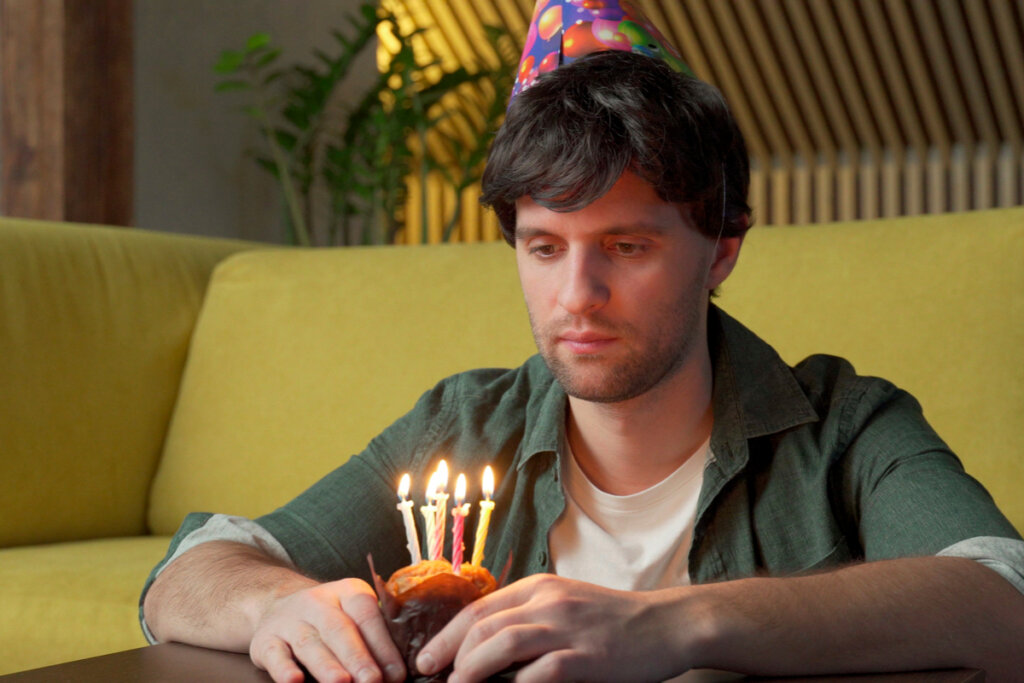The Happiness Boomerang Effect


Written and verified by the psychologist Valeria Sabater
There can be few experiences as frustrating as seeking happiness. It could be said that our continual search for happiness is down to our self-help culture. It convinces us that our aims in life are none other than to find maximum well-being, constant joy, and endless smiles. However, isn’t that what human beings have always tried to do? To seek pleasure and avoid pain.
As a matter of fact, as a human being, you’re neurologically programmed for this purpose. However, in your attempts, you often stumble, step on banana peels, and repeatedly trip on the same stones that cause you suffering. Maybe seeking happiness is a trap, a vicious circle that, the more you work toward it, the more it escapes you.
The problem is that, on occasions, when you get involved in activities, relationships, or experiences that are supposed to improve your well-being, you suddenly feel frustrated, ashamed, or uncomfortable. In fact, you look around you and say to yourself “What am I even doing here?”. This experience has a name and it’s worth finding out about.
Well-being and happiness are extremely complex entities. They don’t follow any specific pattern, no matter how hard we try to make them do so.

The boomerang effect of happiness
Imagine you’re preparing a birthday party for one of your children with all the enthusiasm in the world. However, when the day comes, you feel enormous sadness. Sadness because your child is growing up too fast. Or, you arrange to help your parents move house but, when you arrive, they insist you leave. They tell you that you didn’t have to come because they can do it on their own.
As a matter of fact, there are many daily situations that should provide you with feelings of well-being. but instead, bring the sting of disappointment. The happiness boomerang effect defines those realities in which you throw yourself, hoping to experience fulfillment. But, in reality, they only bring frustration, discouragement, and even unhappiness. We could give a thousand examples of these kinds of events. Indeed, we’ve all experienced them.
Science claims that the practices of gratitude, as well as those of helping others, affect our happiness. Research conducted by the Adolfo Ibáñez University (Chile) emphasizes this link with our quality of life. That said, they insist that the practices that we label as positive don’t always bring us happiness.
Sometimes, practices such as gratitude or helping others can result in unexpected situations that bring disappointment or confusion. But that doesn’t mean we should give up on these actions.
When the positive turns unpleasant
Sonja Lyubomirsky, a professor at the University of California at Riverside (USA) is one of the greatest references in the field of positive psychology. She’s studied the concept of the boomerang effect of happiness in depth. She claims that most of us have an extremely standardized concept and idea about what positive activities are.
Sharing time with friends, expressing gratitude, helping others, enjoying free time, or even falling in love are the kinds of situations that maximize your well-being and bring you happiness. What’s more, as a human being, you try to promote positive situations and activities in your daily life.
On the other hand, there’s one factor that you almost never take into account. It’s the fact that you don’t have control over every reality and event. Indeed, there’s always that one chaotic variable that can give you, at any moment, the exact opposite of what you expected.
It’s like throwing a boomerang. It’s obvious that 99 percent of the time, it’ll come back to you. But sometimes, a treacherous breeze or wind can divert its path and it ends up hitting you. Consequently, those experiences you labeled as positive, often don’t turn out to be.
Happiness is not a rule of three
We’ve all suffered the boomerang effect at some time or another. For example, someone might try their best to get a job but, when they do, they encounter an oppressive work environment and difficult conditions. Or, there are those who go out of their way to make certain people happy because they love them, but all they receive in return is selfishness which makes them unhappy.
Sooner or later, you learn that there’s no exact rule, recipe, or instruction manual for happiness. What works for some brings emotional misery and bewilderment to others. What seems devastating to some is exciting to others. Moreover, fate occasionally plays dice with you and topples your happy little house of cards.
As a human being, you’re obliged to accept uncertainty and a quota of chaos that can alter everything. However, despite the uncomfortable variable of uncertainty, you mustn’t give up on your hope of achieving well-being and fulfillment.

Live, take care of yourself and happiness will come
Viktor Frankl rightly claimed that happiness is like a butterfly. The more you search for it, the more it escapes you. However, sometimes, you just have to stay still for long enough for it to settle on you. That’s the key. Also, you must understand that you shouldn’t give up in the face of every disappointment, failure, or twist of fate.
The happiness boomerang effect claims that these counterproductive effects allow you to better adjust your expectations to seek well-being in the appropriate places. It doesn’t mean giving up. It simply means knowing how to better select the kinds of activities, relationships, and lifestyles you should or shouldn’t get involved in.
After all, genuine happiness is nothing more than psychological well-being. It means being kind to yourself and those around you. You must work on many aspects of yourself, and accept your mistakes, failures, and disappointments. No one is happy when they throw themselves at random experiences. You have to reflect, meditate, and choose well what you do and who you have in your own life.
Last but not least, you must accept the unpredictability of life and the fact that, as much as you might wish it, you can’t control everything around you. Existence is complex, almost as complex as the human being. You simply have to accept its chaotic nature.
All cited sources were thoroughly reviewed by our team to ensure their quality, reliability, currency, and validity. The bibliography of this article was considered reliable and of academic or scientific accuracy.
- Carter, T. J., & Gilovich, T. (2010). The relative relativity of material and experiential purchases. Journal of Personality and Social Psychology, 98(1), 146.
- Fang, S., Galambos, N. L., Johnson, M. D., & Krahn, H. J. (2018). Happiness is the way: Paths to civic engagement between young adulthood and midlife. International Journal of Behavioral Development, 42(4), 425–433.
- Fredrickson, B. L., Mancuso, R. A., Branigan, C., & Tugade, M. M. (2000). The undoing effect of positive emotions. Motivation and Emotion, 24(4), 237–258.
- Unanue W, Gomez Mella ME, Cortez DA, Bravo D, Araya-Véliz C, Unanue J, Van Den Broeck A. The Reciprocal Relationship Between Gratitude and Life Satisfaction: Evidence From Two Longitudinal Field Studies. Front Psychol. 2019 Nov 8;10:2480. doi: 10.3389/fpsyg.2019.02480. PMID: 31780992; PMCID: PMC6857001.
This text is provided for informational purposes only and does not replace consultation with a professional. If in doubt, consult your specialist.








